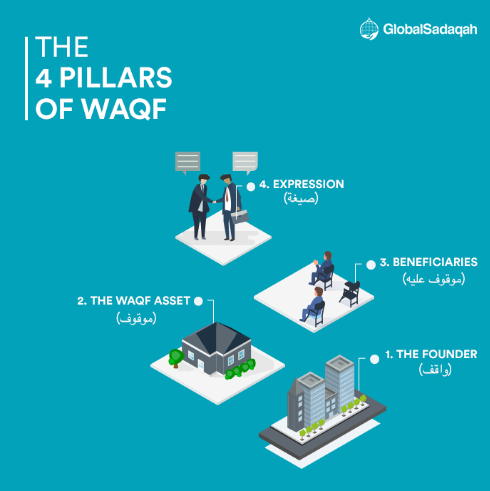The 4 Pillars of Waqf
In waqf, there are 4 pillars which are:
- The Founder (واقف)
- The Waqf Asset (موقوف)
- Beneficiaries (موقوف عليه)
- Expression ( صيغة)

Conditions for the Founder (Waqif)
- He must own the property at the moment of the endowment.
- He must have the legal capacity (mukallaf) for disposing of his property.
- He should not intend to deprive the inheritors of their due legal rights for the asset.
- Bankruptcy is a blockage for legal capacity. Settle debts before waqf as this right is greater.
- The founder (donor) is a Muslim. But, a waqif can also be non-muslim, provided that the waqf is for Shariah permissible purposes.
- For Muslim waqifs, they will get the reward in both this world and the after world.
- For non-muslim waqifs, they will receive the reward in this world.
The first two of the above-mentioned conditions are the primary conditions and a waqf is considered complete even without the rest of the conditions take place.
Allah says in the Quran:
خُذْ مِنْ أَمْوَالِهِمْ صَدَقَةً تُطَهِّرُهُمْ وَتُزَكِّيهِم بِهَا وَصَلِّ عَلَيْهِمْ إِنَّ صَلَاتَكَ سَكَنٌ لَّهُمْ وَاللَّهُ سَمِيعٌ عَلِيمٌ
Take, [O, Muhammad], from their wealth a charity by which you purify them and cause them to increase, and invoke [Allah‘s blessings] upon them. Indeed, your invocations are reassurance for them. And Allah is Hearing and Knowing. [Surah Tawbah, Ayah 103]
If you give everything away, you are in the wrong. If you give nothing, you are also in the wrong. A person needs to understand that Allah has already decided the matter here and it’s not open for our interpretation based on whom we like and dislike.
Always remember that your rizq is already written for you by Allah. You will get not a dollar more, nor a dollar less.
Conditions for the Waqf Asset (Mawquf)
The contract of waqf can only be valid if the subject matter fulfils the following condition:
- The waqf asset must be valuable in the eyes of Shariah.
- It must be ‘ayn (object that can be seen or touched such as goods, property, assets.).
- Waqf of usufruct (the legal right to use someone else’s asset to generate income or other benefits without harming the asset) is disputed by the scholars in term of whether it is considered as waqf or not. However, a person is always welcome to donate any property (tangible/intangible) or usufruct that he owns.
- Money can also be endowed, which will be invested in income generating projects, and the proceeds donated to the beneficiaries (This was practised during the Ottoman Empire).
- Appointment of an administrator (Mutawalli) or trustee.
The asset must be capable of being utilised without being consumed. - It can be an immovable property such as land and building or movable properties, the dedication of which is customarily practised.
- The asset should be in existence, known and specified. For instance, the waqf of a loan or a profit receivable in the future is not valid.
Some scholars said that money cannot be turned into waqf as it cannot be kept in its original form. Others said that it can be invested and the profit from that shared. In this view, money is accepted, but must be carefully protected from any loss thus it should be converted to a physical asset equivalent in value to the capital as soon as possible.
Conditions for the Beneficiary (Mawquf ‘Alayhi)
Waqf can be made in favour of charitable institutions such as waqf for a mosque. It can also be made in favour of relatives, where the waqf goes to the poor or other charitable purposes when none of them are alive.
Under the waqf system, there are 2 types of beneficiaries along with its own conditions that must be fulfilled. The 2 types are:
- Waqf al-Mu‘ayyan (specified)
- The waqif must specify the beneficiaries of the waqf.
- The beneficiaries can be specific or undetermined such as the relatives or the dhimmis.
- The number of beneficiaries can either be one or more than one. But, for one, the acceptance is required according to the majority of schools.
- Waqf al-Ghayr Mu‘ayyan (unspecified)
- The beneficiaries are specified not in person but in a group and categorised more broadly.
- Examples: poor people, scholars in a certain field, Quran students, other students of knowledge, Mosques or schools.
When a beneficiary is specified, he should be capable of acquiring ownership of the benefit. When the beneficiaries are not specified it is enough that they should be known and the waqf should be for a charitable purpose.
Besides that, waqf can be created in favour of a dhimmi (non-muslim living in a Muslim country and is legally protected), provided that it does not involve any impermissible activities according to shari’ah.
Moreover, if the person or group (beneficiary) for whom the waqf is made is no longer alive or in existence, then the waqf is passed to another beneficiary who meets the same requirements and conditions of the previous beneficiaries. The asset cannot be left without an owner.
Conditions for the Expression
- The expression comprises ‘offer’ only, as the acceptance of the beneficiary is not required. The intention must be clear in the offer.
- The words used for the offer should indicate the creation of waqf.
- Intentions to create waqf and the appointment of a Mutawalli (a manager or custodian of waqf asset who is responsible for the administration of waqf asset) are sufficient for the creation of a waqf.
- Perpetual and not for a certain period (there are different opinions on this). A waqf for a certain period is not allowed – this is the opinion of the majority scholars.
- According to the Shafi’iyyah, Hanabila, Qadhi Abu Yusuf and Muhammad al-Shaibani from the Ahnaf, the declaration of waqf by the waqif is irrevocable as soon as the dedication has been pronounced. Hence, a waqf cannot be revoked after the declaration has been made. Neither can the waqif reserve for himself the power of revocation.
- But, Maliki jurists and Imam Abu Hanifah (which represents a minority opinion within the Hanafi Madhab) have the opinion that a waqf can be revoked at any time before it is confirmed by the qadhi or it is registered.
- No revocation after a declaration is made unless the declaration is made in a will for a future date and is revoked before death.
- Waqf should take effect immediately (no conditions) unless if dedicated through the will, whereby the waqf shall only commence upon the death of the waqif. Such waqf is known as suspended waqf.
- In a suspended waqf, it will only commence upon the death of the waqif.
- The waqf may be cancelled before the death of the waqif.
- The suspended waqf should not apply to more than one-third of the property except with the consent of the heirs.
- A waqf must not be made to depend on such an eventuality of which its occurrence or non-occurrence is equally possible.
- Ex: It is not valid if a person says that if his son graduates or returns from a journey, this house will be made waqf.
Similarly, when the creation and validity of a waqf are subjected to a contingency, it becomes void. For example, if the waqf is made contingent on the death of a person without leaving children, it will be void.
To be continued in part 3…
You can read Part 1 of the series here.

